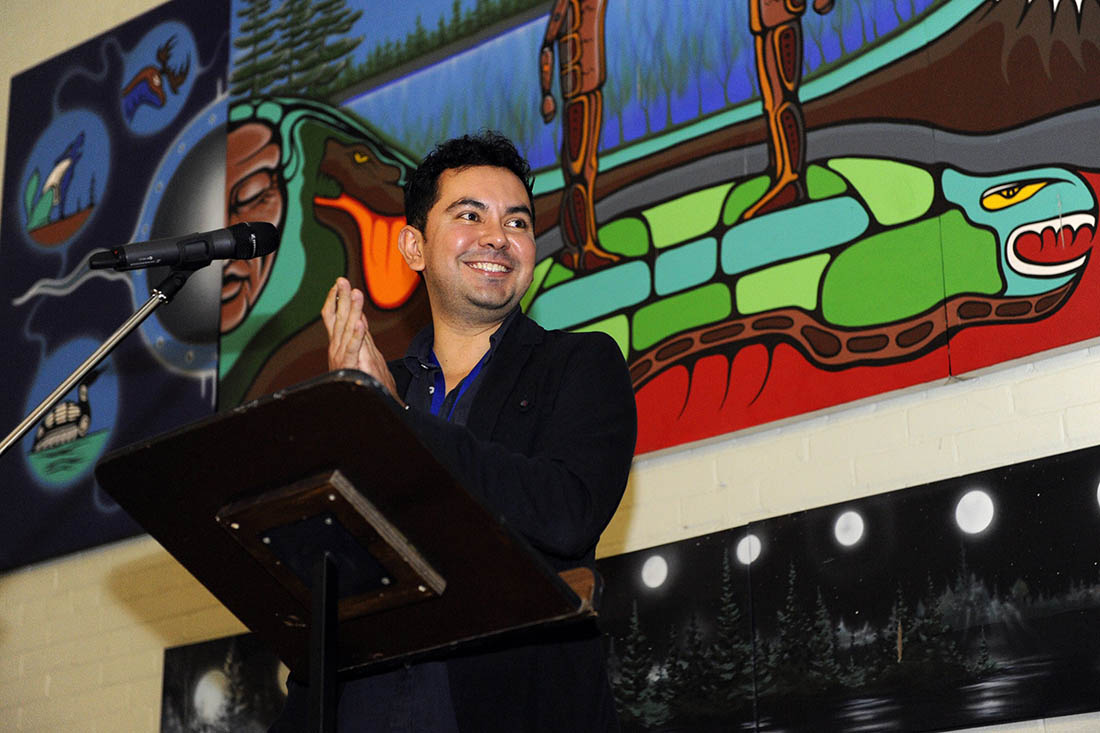Jesse Nodin Wente, Anishnaabe writer, programmer, cultural commentator (born April 1974 in Toronto, ON). Jesse Wente has won audiences through his knowledge of cinema and his ability to articulate the importance of positive Indigenous representation on both sides of the camera, culminating in his role as founding director of the Indigenous Screen Office.
Jesse Wente
Throughout his career, Jesse Wente has held numerous prominent positions related to film. He worked at the Toronto International Film Festival as a programmer and at the Indigenous Screen Office as the inaugural executive director. He has also written
the national bestselling memoir Unreconciled: Family, Truth, and Indigenous Resistance.
(Alberto E. Rodriguez/Getty Images)
Early Life
Jesse Wente was born to parents Constance, an Ojibwe member of the Serpent River First Nation (Genaabaajing Anishinaabek), and Jim, an American from Chicago (see also First Nations in Ontario). He grew up in East York while his parents worked at a nearby industrial park. With both parents working, Wente and his younger sister Maggie were raised by their maternal grandmother Norma. A survivor of St. Joseph’s residential school, Norma taught Wente about the loss of their language. Her influence instilled in him a sense of duty toward their ancestors. Although Wente did not have opportunities to interact with other Indigenous families in Toronto, he frequently visited Serpent River. These stays strengthened his connection to his Indigeneity but also a sense of loss marked by infrequent access to his community.
Wente attended Crescent High School and was the private school’s first Indigenous student. The experience gave him an eye-opening perspective on entitlement. It also heightened his awareness of being the only Indigenous person in the room.
At age three, Wente found his love for cinema when his parents took him to see Star Wars. He became a regular at the Golden Mile Theatre and Fox Theatre but described watching TVO’s Saturday Night at the Movies with his mother as his “earliest film school.” He fed his interest in film by pursuing acting as a child with his only credit being a non-speaking role as “Bully #3” alongside William Shatner on The Ray Bradbury Theatre. His agent didn’t send him for further auditions, noting he needed to grow his hair out for more Indigenous roles, which made him acutely aware of typecasting.
In 1992, Wente enrolled in the Cinema Studies program at the University of Toronto. He successfully applied for a scholarship for Indigenous students with his mother encouraging him to return the favour to his community.
Career as Film Critic and Programmer
During his final year of studies, Jesse Wente received a contract position as an associate producer at the Canadian Broadcasting Corporation (CBC). At the end of his contract, he was assigned to do film reviews on Metro Morning when the regular critic went on leave. He was hired full-time with the CBC in 1998, and in his role as film critic and producer, he used his position to uplift Indigenous voices.
In 2005, Wente joined the board of the imagineNATIVE Film + Media Arts Festival. His responsibilities included assisting with the programming committee. He also programmed for the Reel World Festival. In 2006, he was offered a position as Canadian features programmer for the Toronto International Film Festival (TIFF) and left the CBC. His skills as a curator and community leader inspired TIFF’s Noah Cowan to hire him to run TIFF Bell Lightbox when it opened in 2010 and oversee its programming, including TIFF Cinematheque. He curated the First People’s Cinema in 2012, at that point the largest global retrospective of Indigenous cinema, and 2017’s Aazbingawaski “Wide Awake” Indigenous film series.
Wente described TIFF as his “dream job” but said that he later felt tokenized by the organization. He submitted his resignation to TIFF shortly before the 2017 festival after programmers selected three films they specifically asked him to screen through an Indigenous lens, including the Hollywood western Hostiles, which Wente called “actively racist.”
Jesse Wente at the Toronto International Film Festival
Jesse Wente worked as a programmer for the Toronto International Film Festival (TIFF). During his time at TIFF, Wente ran the TIFF Bell Lightbox and oversaw TIFF Cinematheque. He also curated the First People’s Cinema and Aazbingawaski “Wide Awake”
Indigenous film series.
(George Pimentel/WireImage/Getty Images)
Indigenous Screen Office
In 2018, Jesse Wente was appointed the founding director of the Indigenous Screen Office (ISO), an independent entity created to improve First Nations, Métis and Inuit representation in film and television. He began as the ISO’s lone employee and was tasked with laying the foundation for the organization as it grew to fund Indigenous-led projects and foster capacity building. By 2022, the ISO grew the presence of Indigenous filmmaking in Canada and had expanded to an operation with 10 full-time employees (see also Influential Indigenous Filmmakers in Canada). He announced in 2022 that he was stepping away from his position after completing his objectives for his tenure.
Work as Advocate, Producer and Writer
Jesse Wente has served on numerous boards, including the Toronto Arts Council and the Canada Council for the Arts, the latter of which he served as chair from 2020 to 2025. He was the first Indigenous person to hold the position.
He served as producer of the 2020 documentary Inconvenient Indian, which drew wide acclaim for its portrait of Indigenous screen representation and cultural appropriation. However, the film’s distribution was paused, in consultation with Wente, when director Michelle Latimer’s claims of Indigenous identity were challenged that December. The film subsequently streamed via the Aboriginal People’s Television Network in 2022.
In 2025, Wente was appointed the Indigenous Storyteller in Residence at the Toronto Metropolitan University. He is also an author, having published the 2021 memoir Unreconciled: Family, Truth, and Indigenous Resistance, which became a national bestseller. In 2025, he announced his first children’s book, Danger Eagle, inspired by a childhood toy that helped him think more critically about filmmaking. He has made many appearances in documentaries, speaking events and guest roles to share his knowledge of cinema.
Personal Life
Jesse Wente is married to his wife, Julie, a lawyer. They have two children.
Awards
- Reelworld Activist Award, Reelworld Film Festival (2017)
- Ann Arbor Award, University of Toronto (2021)
- Kobo Emerging Writers Prize in Non-Fiction (2022)
- BMO Communicator of the Year, IABC/Toronto (2022)

 Share on Facebook
Share on Facebook Share on X
Share on X Share by Email
Share by Email Share on Google Classroom
Share on Google Classroom



